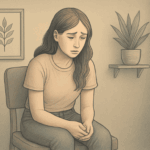Best Therapy for Depression – CBT, DBT, and More

With so many ways to treat depression, how are you supposed to know which is the right choice for you? The truth is: the answer is different for everyone.
Some people prefer to ‘go it on their own,’ trying self-help methods like exercise and meditation, while others prefer to lean on professionals for support, such as their doctor and a mental health professional.
However, if you’re looking for treatments for depression, one option you’ll often be directed towards is therapy. Evidence shows that therapy for depression has many benefits. Not only can it help reduce depressive symptoms, but it may also help you learn new coping strategies to manage other stresses in your life.
On this page, we’ll explore the evidence for therapy as an effective treatment approach for depression, as well as the different therapy options out there if you’re struggling with depression.

Is Therapy an Effective Treatment Approach for Depression?
The National Institute for Clinical Excellence (NICE) Guidelines recommend a variety of treatment options for depression depending on the symptoms, including cognitive behavioral therapy (CBT), exercise, group therapy, medications, guided self-help, and holistic approaches like mindfulness, yoga, and nutrition.1
While medication focuses on relieving the symptoms of depression, therapy can help with any underlying problems that may be triggering and keeping the depression coming back. It can help you to find coping strategies that work for you and allow you to discover what can trigger these strong feelings inside you, which helps to create long-lasting change.2
Therapy is an effective treatment for depression and can often bring long-lasting relief.3 Several different therapy approaches have been studied and found to be really helpful in reducing the symptoms of depression and also preventing it from coming back.
Most Effective Depression Treatments for Adults
So, therapy can definitely be an effective treatment for depression. But with so many different types of therapy available, you might be wondering “Which one is right for me?” It’s a good question and one that many people have when they start their journey toward healing.
There are various therapeutic approaches, each one unique in its focus and methods. In this article, we’re going to break down some of the most popular and well-researched therapies, explain briefly how they work, and tell you which ones are shown to be most effective for treating depression based on research studies. By the end, you’ll hopefully have a clearer understanding of the options available and which one might suit your needs best.
Interpersonal Psychotherapy for Depression
Interpersonal psychotherapy (IPT) for depression works by helping you understand your personal relationships with other people and how they affect you. It is a structured type of therapy that can help you discover any problems or negative patterns that occur in your relationships. This then allows you to work out strategies for how to cope with them.9 This enables your relationships to improve over time, which means that depressive symptoms may ease away.4
One review found that there was no significant difference between the outcomes of IPT vs antidepressants.10
Psychodynamic Therapy for Depression
Psychodynamic therapy looks at how your past experiences in life are affecting you in the present. It explores themes of loss, self-criticism, hopelessness, and vulnerability, which can all contribute to your depressive symptoms. Through this therapy, you can find ways to help you tolerate these uncomfortable feelings and learn to rely on your own ability to feel good and handle disappointments.4
Research found psychodynamic therapy to be equally as effective as other therapies when used for depression, with the positive effects often maintained in the long term.6 It also found that it was as effective as medication alone. However, this therapy has less research generally into its effectiveness than therapies such as CBT due to its limitations in measurable outcomes.7
Dialectical Behavior Therapy for Depression
DBT can teach you key skills to help you manage overwhelming feelings, tolerate distressing feelings using healthy coping mechanisms, and improve the relationships you have. While it was originally developed to help people who have borderline personality disorder (BPD) its effectiveness covers a wide range of mental health challenges, including depression. DBT helps you not only cope with your emotions but also allows you to lead a more balanced and fulfilling life. It can be particularly helpful if you are looking for structured support to create lasting change.
One study looking into the effectiveness of DBT for depression found a significant decrease in depression in patients once they had therapy compared to those who received only medication.8 This is thought to be due to the therapy teaching skills to patients which helped them to cope with their distress more effectively.
Cognitive Behavioral Therapy for Depression
CBT is one of the most studied therapies for depression and has a wealth of evidence to show its effectiveness. A research paper conducted a large-scale analysis of studies related to CBT for depression and found CBT was an effective treatment for adult depression. Compared to control groups (those who did not have CBT therapy or had a placebo), CBT was found to be better. It also found that people who had CBT for depression had lower relapse rates after one- and two-year follow-up intervals than people who just received medication.5
Acceptance and Commitment Therapy for Depression
Research has been conducted on the effectiveness of ACT for depression. One study found that early interventions were effective in reducing depressive symptoms.12 Another study found that patients’ depressive symptoms were reduced both immediately after therapy as well as three months afterward.13
Mindfulness-Based Cognitive Therapy (MBCT)
Research also shows that treatment with MBCT reduced symptoms of depression from severe to mild levels. However, this study was based on only a small number of patients, so this must be taken into consideration when looking at these results.15 Other studies have shown that MBCT is more effective for people who have depressive symptoms which fluctuate, and that compared to usual care, MBCT produces a significant reduction in rumination.16,17
Eye Movement Desensitization and Reprocessing for Depression
One paper found that EMDR is an effective treatment for improving depression symptoms, helping one-third of people. However, this was based on a small number of studies. The authors felt that further research into the topic was needed to understand the long-term effects of EMDR preventing a relapse into depression.18 Another study found EMDR was comparable in terms of improvement of symptoms to CBT.19
Group Therapy for Depression
The American Psychological Association says that group therapy is as effective as individual therapy for a wide range of conditions and that groups can even be more effective than one-to-one therapy because you may feel less judged, knowing that you are in a room with people who are all experiencing similar issues and who can understand you.20
Research has shown that group therapy is effective for depression as well as other conditions.21
Seek Therapy for Depression Today
If you’re struggling with depression, you don’t have to face it alone. Seeking out help is a brave first step towards feeling better, and we are here to support you. We offer a range of therapeutic services tailored to your individual needs and have experienced therapists ready to help you navigate your challenges.
Whether you are interested in individual therapy, group support, or a specific treatment approach, we will collaborate with you to find the right option for you. Contact us now to schedule your initial consultation, where we will assess your needs and help you choose the best course of action to feel better.
References
- National Institute for Health and Care Excellence. (2022). Depression in adults: treatment and management [NICE Guideline [NG222]]. https://www.nice.org.uk/guidance/ng222/chapter/recommendations#table-1
- BACP. (2022, January 17). Depression | How counselling can help. https://www.bacp.co.uk/about-therapy/what-therapy-can-help-with/depression/
- Linde, K., Sigterman, K., Kriston, L., Rücker, G., Jamil, S., Meissner, K., & Schneider, A. (2015). Effectiveness of psychological treatments for depressive disorders in primary care: systematic review and meta-analysis. Annals of family medicine, 13(1), 56–68. https://doi.org/10.1370/afm.1719
- APA. (n.d.). Depression treatments for adults. https://www.apa.org. https://www.apa.org/depression-guideline/adults
- Cuijpers, P., Berking, M., Andersson, G., Quigley, L., Kleiboer, A., & Dobson, K. S. (2013). A Meta-Analysis of Cognitive-Behavioural Therapy for Adult Depression, Alone and in Comparison with other Treatments. The Canadian Journal of Psychiatry, 58(7), 376–385. https://doi.org/10.1177/070674371305800702
- Luyten, P., & Blatt, S. J. (2012). Psychodynamic treatment of Depression. Psychiatric Clinics of North America, 35(1), 111–129. https://doi.org/10.1016/j.psc.2012.01.001
- Ribeiro, Â., Ribeiro, J. P., & Von Doellinger, O. (2017). Depression and psychodynamic psychotherapy. Brazilian Journal of Psychiatry, 40(1), 105–109. https://doi.org/10.1590/1516-4446-2016-2107
- Meygoni, A. K. M., & Ahadi, H. (2012). Declining the rate of major Depression: Effectiveness of Dialectical Behavior therapy. Procedia – Social and Behavioral Sciences, 35, 230–236. https://doi.org/10.1016/j.sbspro.2012.02.083
- Types of counselling and psychotherapy. (n.d.). https://www.bacp.co.uk/about-therapy/types-of-therapy/
- Cohen, Z. D., Breunese, J., Markowitz, J. C., Weitz, E. S., Hollon, S. D., Browne, D. T., Rucci, P., Corda, C., Menchetti, M., Weissman, M. M., Bagby, R. M., Quilty, L. C., Blom, M. B. J., Altamura, M., Zobel, I., Schramm, E., Gois, C., Twisk, J. W. R., Wienicke, F. J., . . . Driessen, E. (2024). Comparative efficacy of interpersonal psychotherapy and antidepressant medication for adult depression: a systematic review and individual participant data meta-analysis. Psychological Medicine, 54(14), 3785–3794. https://doi.org/10.1017/s0033291724001788
- BABCP (n.d.). Acceptance and Commitment Therapy (ACT). https://babcp.com/ACT
- Bohlmeijer, E. T., Fledderus, M., Rokx, T. A., & Pieterse, M. E. (2011). Efficacy of an early intervention based on acceptance and commitment therapy for adults with depressive symptomatology: Evaluation in a randomized controlled trial. Behaviour research and therapy, 49(1), 62–67. https://doi.org/10.1016/j.brat.2010.10.003
- Bai, Z., Luo, S., Zhang, L., Wu, S., & Chi, I. (2019). Acceptance and Commitment Therapy (ACT) to reduce depression: A systematic review and meta-analysis. Journal of Affective Disorders, 260, 728–737. https://doi.org/10.1016/j.jad.2019.09.040
- NHS (2025, January 15). Types of talking therapy. https://www.nhs.uk/mental-health/talking-therapies-medicine-treatments/talking-therapies-and-counselling/types-of-talking-therapies/
- Barnhofer, T., Crane, C., Hargus, E., Amarasinghe, M., Winder, R., & Williams, J. M. (2009). Mindfulness-based cognitive therapy as a treatment for chronic depression: A preliminary study. Behaviour research and therapy, 47(5), 366–373. https://doi.org/10.1016/j.brat.2009.01.019
- MacKenzie, M. B., Abbott, K. A., & Kocovski, N. L. (2018). Mindfulness-based cognitive therapy in patients with depression: current perspectives. Neuropsychiatric disease and treatment, 14, 1599–1605. https://doi.org/10.2147/NDT.S160761
- Perestelo-Perez, L., Barraca, J., Peñate, W., Rivero-Santana, A., & Alvarez-Perez, Y. (2017). Mindfulness-based interventions for the treatment of depressive rumination: Systematic review and meta-analysis. International Journal of Clinical and Health Psychology, 17(3), 282–295. https://doi.org/10.1016/j.ijchp.2017.07.004
- Carletto, S., Malandrone, F., Berchialla, P., Oliva, F., Colombi, N., Hase, M., Hofmann, A., & Ostacoli, L. (2021). Eye movement desensitization and reprocessing for depression: a systematic review and meta-analysis. European Journal of Psychotraumatology, 12(1). https://doi.org/10.1080/20008198.2021.1894736
- Carletto, S., Malandrone, F., Berchialla, P., Oliva, F., Colombi, N., Hase, M., Hofmann, A., & Ostacoli, L. (2021). Eye movement desensitization and reprocessing for depression: a systematic review and meta-analysis. European journal of psychotraumatology, 12(1), 1894736. https://doi.org/10.1080/20008198.2021.1894736
- Pappas, S. (2023, March 1). Group therapy is as effective as individual therapy, and more efficient. Here’s how to do it successfully. American Psychological Association. https://www.apa.org/monitor/2023/03/continuing-education-group-therapy
- Rosendahl, J., Alldredge, C. T., Burlingame, G. M., & Strauss, B. (2021). Recent developments in group psychotherapy research. American Journal of Psychotherapy, 74(2), 52–59. https://doi.org/10.1176/appi.psychotherapy.20200031






